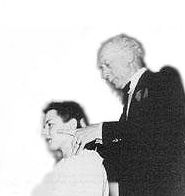
Many people's creative drive might be considered compulsory - but because it's creative rather than destructive, it's not considered a disorder, but an inspiration.
I see the assumption that "the solution must be comparably intense so as to combat the problem's intensity" to be an expression of the mistake of bouncing from extreme to extreme. I think the reason it's so common of an assumption is from a cultural history of implied opposites and that using will must be a battle. The opposite of a hateful problem is to first just stop repeating the problem.
That assumption is wrong, as F.M. Alexander discovered, among others. If you assume those extremes, you'll miss information that your twisted senses have learned to ignore as being of no consequence. To find something you love to do, it works better to notice what comes easily & naturally to you and what you find yourself doing most effortlessly. Passion is more of an absorbing patience that allows openings, rather than a desperate compulsion, as the historical root of the word implies.
For Alexander to find that out for himself involved going through a paradoxical process he taught himself that involved building new assumptions. Fortunately, his solutions of how to go from "repair to effortlessness" turned out to work for others who might be in his situation. I imagine that any additional means of expressing these principles us teachers of AT come up with from our own experience can only add to Alexander's. Those who learn from us cannot help but benefit from them.
Marj Barstow's (Alexander's first graduate) opinion on this was, "However much you can move in the direction you want to go, what you wanted to prevent will be left behind. You can't go both ways at the same time." Marj also said that, "Prevention works with less effort than repair - just like with maintaining cars."
From that conversation and those since, I have since regarded many of Alexander's techniques, (such as his specialized way of using his concept of Inhibition,) to be on the order of "repair." Sometimes people's problems need these repairs. I did. I became injured and couldn't help but train myself to cope with pain by limiting movement during recovery that I later wanted to stop. Alexander's repair methods worked well. That usage alone proved to me Alexander's work is useful for anyone from any starting point. You don't need to use all the tools if the problem will respond to some of the tools.
No comments:
Post a Comment